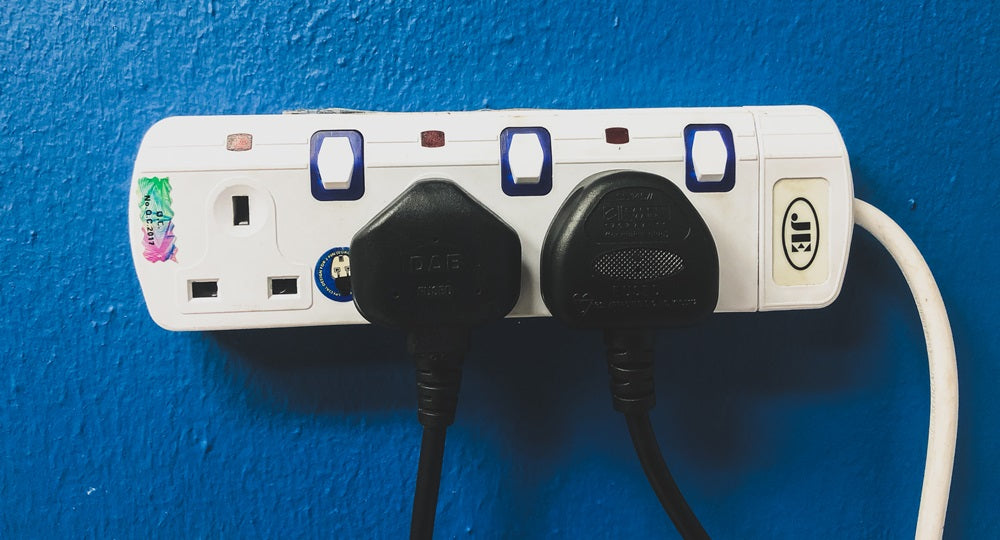
Are Broken Plug Sockets Dangerous?
Plug sockets are essential features in every UK home, quietly providing the electrical power we rely on daily. When they become damaged or broken, however, they can pose significant risks to your property and, more importantly, your safety. This article explores the dangers of broken plug sockets and offers guidance on what to do if you spot one in your home.
Common Signs of a Damaged Socket
Before discussing the dangers, it's important to recognise the signs of a broken plug socket:
- Visible cracks or scorch marks
- Loose-fitting plugs that don't stay in place
- Unusual noises when inserting or removing plugs
- Sparks when plugging in or unplugging devices
- Socket feels warm or hot to touch
- Tripped circuit breakers when using the socket
- Burning smell coming from the socket
The Dangers of Broken Plug Sockets
1. Electrical Shock Risk
Perhaps the most immediate danger is the risk of electric shock. A damaged socket may expose live wires or components, creating a direct path for electricity to flow through anyone who touches it. The standard UK mains voltage is 230V, which is more than enough to cause severe injury or even death.
2. Fire Hazard
Broken sockets can lead to electrical fires through several mechanisms:
- Electrical arcing: When a socket is damaged, electricity may "jump" across damaged components, creating sparks that can ignite nearby materials.
- Overheating: Loose connections within a damaged socket can create resistance, generating heat that may eventually cause a fire.
- Short circuits: Exposed wires might come into contact with each other, creating a short circuit that generates excessive heat.
According to the Home Office, faulty electrical installations, including damaged sockets, account for approximately 15% of domestic fires in the UK each year.
3. Damage to Electrical Devices
Even if a broken socket doesn't cause immediate harm to people, it can damage any devices plugged into it. Unstable power delivery can cause voltage fluctuations that may destroy sensitive electronics or reduce their lifespan.
What to Do If You Find a Broken Socket
If you discover a damaged socket in your home:
- Turn off the power: Switch off the electricity at the consumer unit (fuse box) for the affected circuit.
- Mark the socket: Place a warning note over it so others know not to use it.
- Call a qualified electrician: Socket replacement should always be carried out by a professional with the appropriate qualifications. In the UK, look for electricians registered with NICEIC, ELECSA, or other recognised certification schemes.
- Never attempt DIY repairs: Working with electrical installations without proper training is both illegal under Building Regulations and extremely dangerous.
Preventative Measures
To reduce the risk of socket damage:
- Don't overload sockets with multiple adapters
- Unplug devices by gripping the plug rather than pulling on the cable
- Regularly inspect sockets for signs of damage
- Consider upgrading older sockets to modern ones with additional safety features
- Install RCDs (Residual Current Devices) for additional protection
Legal Requirements
It's worth noting that under the Electricity at Work Regulations 1989, landlords and business owners have a legal responsibility to ensure that electrical installations in their properties are safe. For homeowners, while there's no specific legal obligation, your home insurance may be invalidated if damaged electrical items cause incidents.
Conclusion
Broken plug sockets are not merely an inconvenience—they represent a serious safety hazard that should never be ignored. The risks of electric shock, fire, and damage to appliances far outweigh the cost of professional replacement. If you spot any signs of damage to your sockets, act promptly and call a qualified electrician to assess and resolve the issue.
Remember, when it comes to electrical safety, it's always better to be cautious. Your family's safety and your property's protection are worth the investment in proper electrical maintenance.
This article is for informational purposes only and should not be used as a substitute for professional electrical advice. Always consult a qualified electrician for electrical issues in your home.
Energizer A-Rated Bulbs

Energizer S29628 A Rated LED Elite GLS E27 Filament 806lm 3.8W 2700K (Warm White)
Energizer S29628 A Rated LED Elite GLS E27 Filament 806lm 3.8W 2700K (Warm White) Energizer products are recognised as one of the most trusted and ...
View full details
Energizer S29628 A Rated LED Elite GLS E27 Filament 806lm 3.8W 2700K (Warm White)(12 Pack)
Energizer S29628 A Rated LED Elite GLS E27 Filament 806lm 3.8W 2700K (Warm White)(12 Pack) Energizer products are recognised as one of the most tru...
View full details
Energizer S29629 A Rated LED Elite GLS E27 Filament 806lm 3.8W 6500K (Daylight)
Energizer S29629 A Rated LED Elite GLS E27 Filament 806lm 3.8W 6500K (Daylight) Energizer products are recognised as one of the most trusted and hi...
View full details
Energizer S29629 A Rated LED Elite GLS E27 Filament 806lm 3.8W 6500K (Daylight)(12 Pack)
Energizer S29629 A Rated LED Elite GLS E27 Filament 806lm 3.8W 6500K (Daylight)(12 Pack) Energizer products are recognised as one of the most trust...
View full details
Energizer S29630 A Rated LED Elite GLS B22 Filament 806lm 3.8W 2700K (Warm White)
Energizer S29630 A Rated LED Elite GLS B22 Filament 806lm 3.8W 2700K (Warm White) Energizer products are recognised as one of the most trusted and ...
View full details
Energizer S29630 A Rated LED Elite GLS B22 Filament 806lm 3.8W 2700K (Warm White)(12 Pack)
Energizer S29630 A Rated LED Elite GLS B22 Filament 806lm 3.8W 2700K (Warm White)(12 Pack) Energizer products are recognised as one of the most tru...
View full details
Energizer S29631 A Rated LED Elite GLS B22 Filament 806lm 3.8W 6500K (Daylight)
Energizer S29631 A Rated LED Elite GLS B22 Filament 806lm 3.8W 6500K (Daylight) Energizer products are recognised as one of the most trusted and hi...
View full details
Energizer S29631 A Rated LED Elite GLS B22 Filament 806lm 3.8W 6500K (Daylight)(12 Pack)
Energizer S29631 A Rated LED Elite GLS B22 Filament 806lm 3.8W 6500K (Daylight)(12 Pack) Energizer products are recognised as one of the most trust...
View full details
Energizer S29632 A Rated LED Elite GLS E27 Filament 1521lm 7.2W 2700K (Warm White)
Energizer S29632 A Rated LED Elite GLS E27 Filament 1521lm 7.2W 2700K (Warm White) Energizer products are recognised as one of the most trusted and...
View full details
Energizer S29632 A Rated LED Elite GLS E27 Filament 1521lm 7.2W 2700K (Warm White)(12 Pack)
Energizer S29632 A Rated LED Elite GLS E27 Filament 1521lm 7.2W 2700K (Warm White)(12 Pack) Energizer products are recognised as one of the most tr...
View full details
Energizer S29633 A Rated LED Elite GLS E27 Filament 1521lm 7.2W 6500K (Daylight)
Energizer S29633 A Rated LED Elite GLS E27 Filament 1521lm 7.2W 6500K (Daylight) Energizer products are recognised as one of the most trusted and h...
View full details
Energizer S29633 A Rated LED Elite GLS E27 Filament 1521lm 7.2W 6500K (Daylight)(12 Pack)
Energizer S29633 A Rated LED Elite GLS E27 Filament 1521lm 7.2W 6500K (Daylight)(12 Pack) Energizer products are recognised as one of the most trus...
View full details
Energizer S29634 A Rated LED Elite GLS B22 Filament 1521lm 7.2W 2700K (Warm White)
Energizer S29634 A Rated LED Elite GLS B22 Filament 1521lm 7.2W 2700K (Warm White) Energizer products are recognised as one of the most trusted and...
View full details
Energizer S29634 A Rated LED Elite GLS B22 Filament 1521lm 7.2W 2700K (Warm White)(12 Pack)
Energizer S29634 A Rated LED Elite GLS B22 Filament 1521lm 7.2W 2700K (Warm White)(12 Pack) Energizer products are recognised as one of the most tr...
View full details
Energizer S29635 A Rated LED Elite GLS B22 Filament 1521lm 7.2W 6500K (Warm White)
Energizer S29635 A Rated LED Elite GLS B22 Filament 1521lm 7.2W 6500K (Warm White) Energizer products are recognised as one of the most trusted and...
View full details
Energizer S29635 A Rated LED Elite GLS B22 Filament 1521lm 7.2W 6500K (Warm White)(12 Pack)
Energizer S29635 A Rated LED Elite GLS B22 Filament 1521lm 7.2W 6500K (Warm White)(12 Pack) Energizer products are recognised as one of the most tr...
View full details
Energizer S29636 A Rated LED Elite Candle E27 Filament 470lm 2.2W 2700K (Warm White)
Energizer S29636 A Rated LED Elite Candle E27 Filament 470lm 2.2W 2700K (Warm White) Energizer products are recognised as one of the most trusted a...
View full details
Energizer S29636 A Rated LED Elite Candle E27 Filament 470lm 2.2W 2700K (Warm White)(12 Pack)
Energizer S29636 A Rated LED Elite Candle E27 Filament 470lm 2.2W 2700K (Warm White)(12 Pack) Energizer products are recognised as one of the most ...
View full details
Energizer S29637 A Rated LED Elite Candle E27 Filament 470lm 2.2W 6500K (Daylight)
Energizer S29637 A Rated LED Elite Candle E27 Filament 470lm 2.2W 6500K (Daylight) Energizer products are recognised as one of the most trusted and...
View full details
Energizer S29637 A Rated LED Elite Candle E27 Filament 470lm 2.2W 6500K (Daylight)(12 Pack)
Energizer S29637 A Rated LED Elite Candle E27 Filament 470lm 2.2W 6500K (Daylight)(12 Pack) Energizer products are recognised as one of the most tr...
View full details
Energizer S29638 A Rated LED Elite Candle B22 Filament 470lm 2.2W 2700K (Warm White)
Energizer S29638 A Rated LED Elite Candle B22 Filament 470lm 2.2W 2700K (Warm White) Energizer products are recognised as one of the most trusted a...
View full details
Energizer S29638 A Rated LED Elite Candle B22 Filament 470lm 2.2W 2700K (Warm White)(12 Pack)
Energizer S29638 A Rated LED Elite Candle B22 Filament 470lm 2.2W 2700K (Warm White)(12 Pack) Energizer products are recognised as one of the most ...
View full details
Energizer S29639 A Rated LED Elite Candle B22 Filament 470lm 2.2W 6500K (Daylight)
Energizer S29639 A Rated LED Elite Candle B22 Filament 470lm 2.2W 6500K (Daylight) Energizer products are recognised as one of the most trusted and...
View full details
Energizer S29639 A Rated LED Elite Candle B22 Filament 470lm 2.2W 6500K (Daylight)(12 Pack)
Energizer S29639 A Rated LED Elite Candle B22 Filament 470lm 2.2W 6500K (Daylight)(12 Pack) Energizer products are recognised as one of the most tr...
View full details
Energizer S29640 A Rated LED Elite Candle E14 Filament 470lm 2.2W 2700K (Warm White)
Energizer S29640 A Rated LED Elite Candle E14 Filament 470lm 2.2W 2700K (Warm White) Energizer products are recognised as one of the most trusted a...
View full details
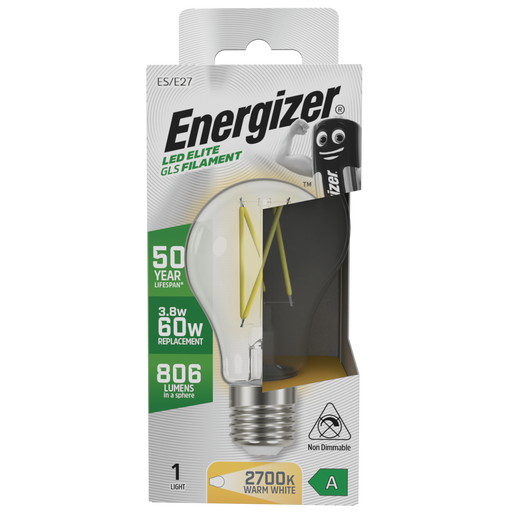
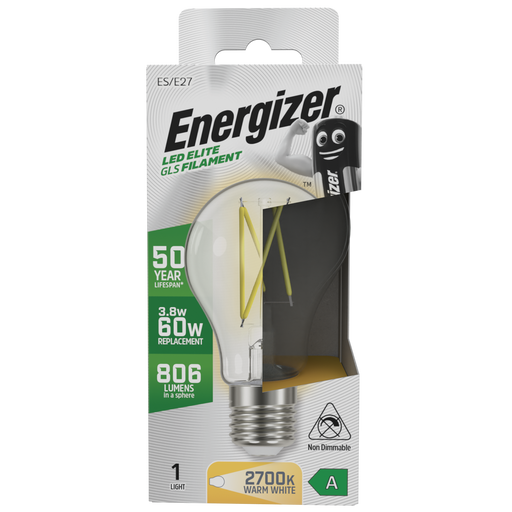
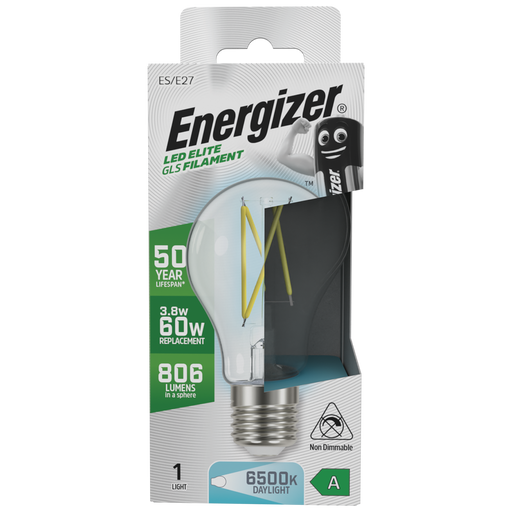

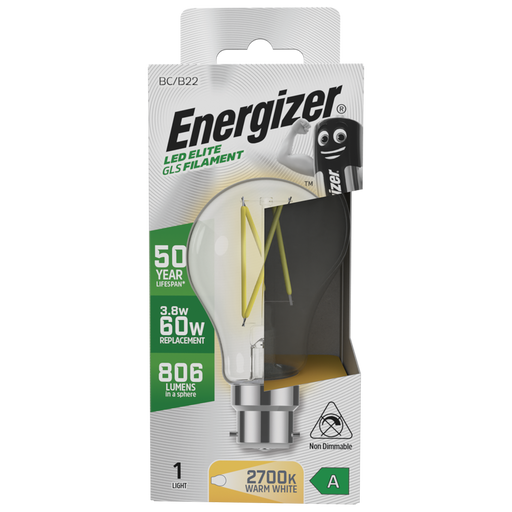

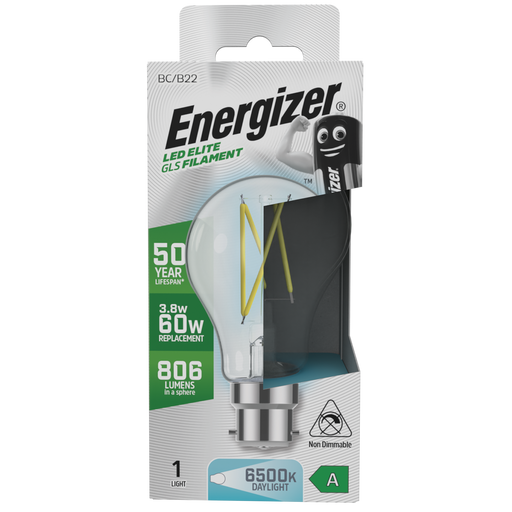

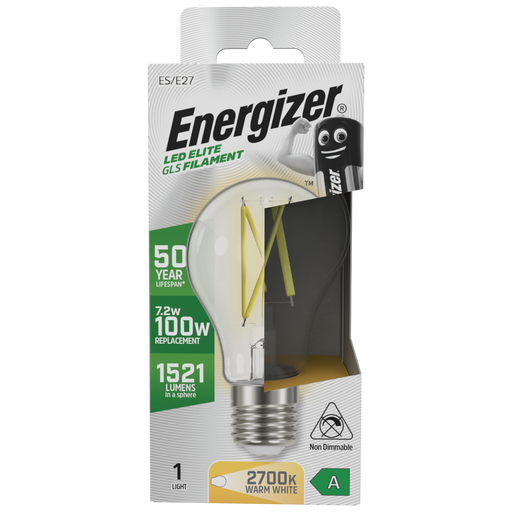

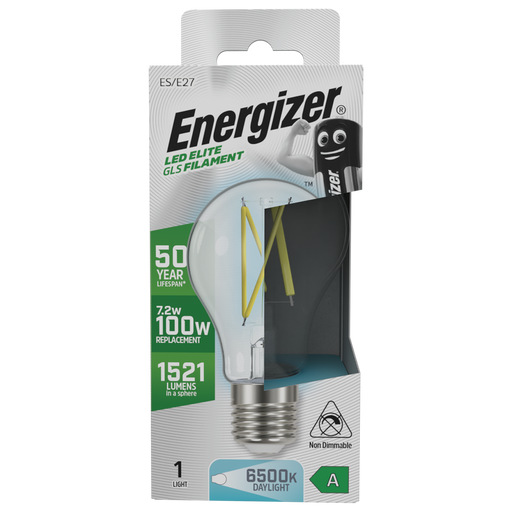

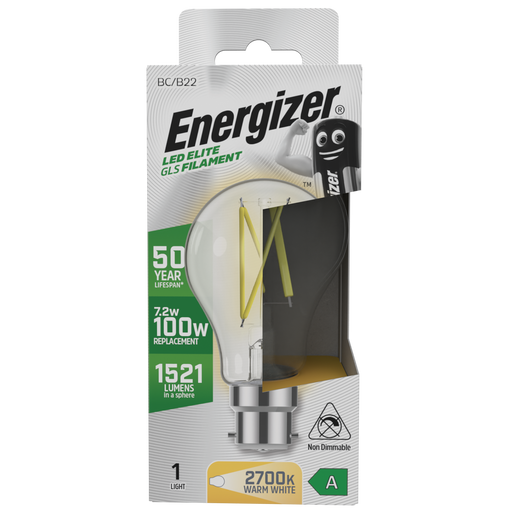
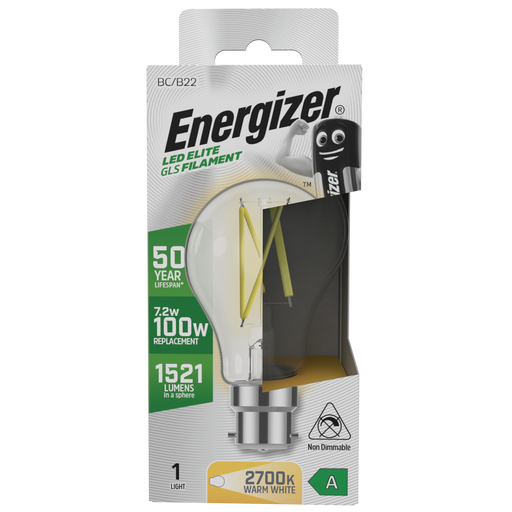
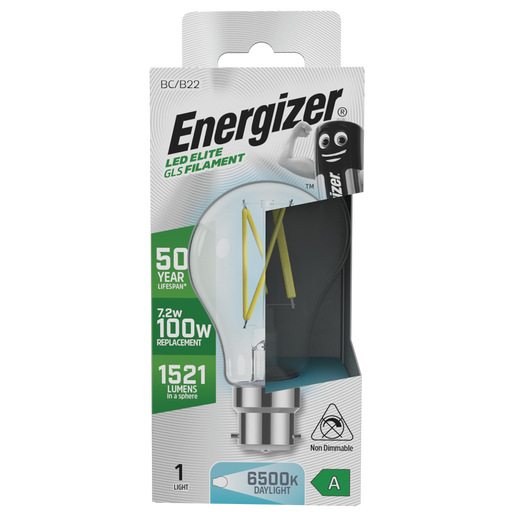
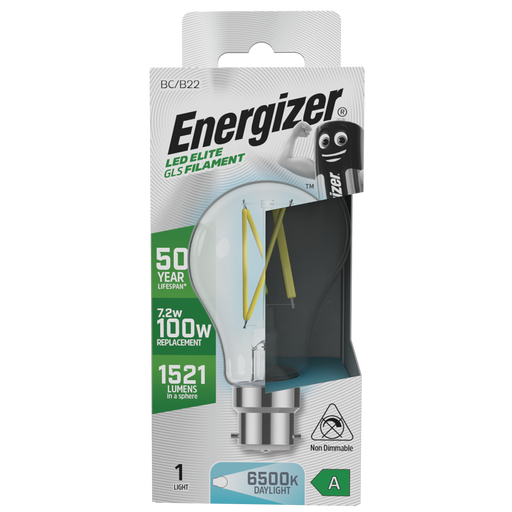
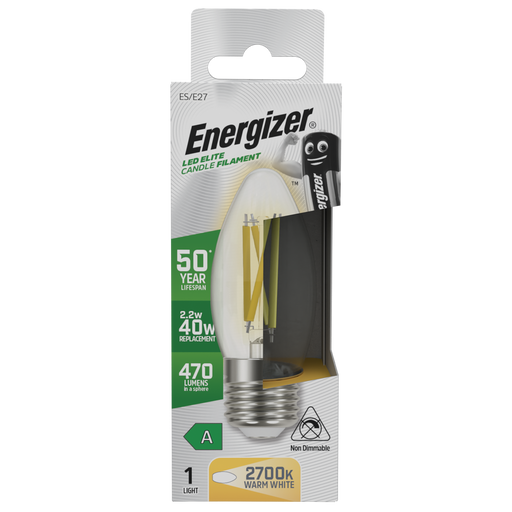
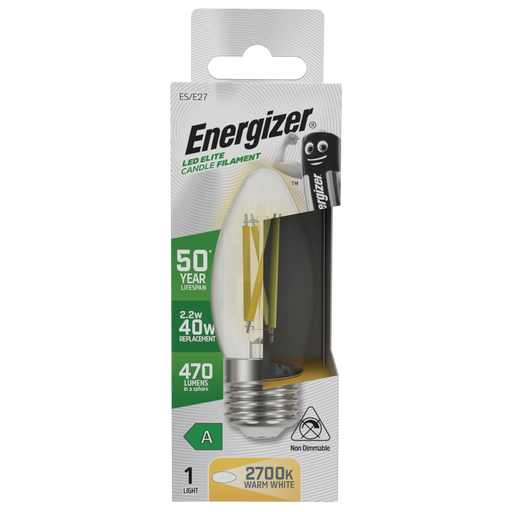
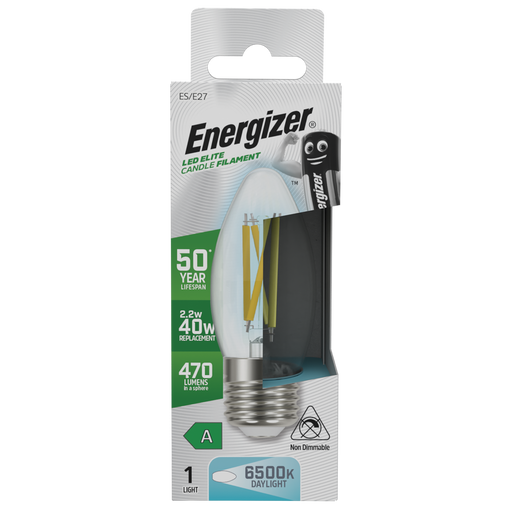
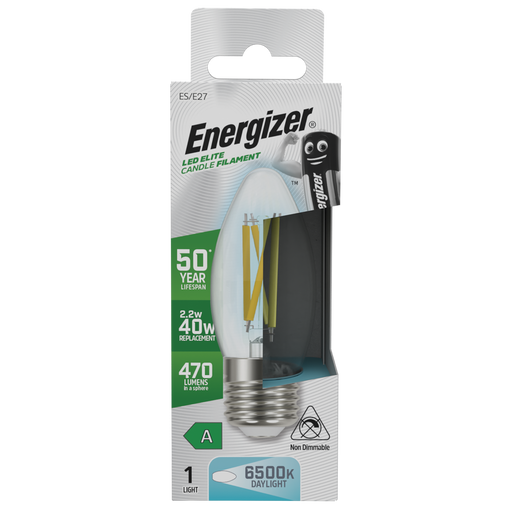
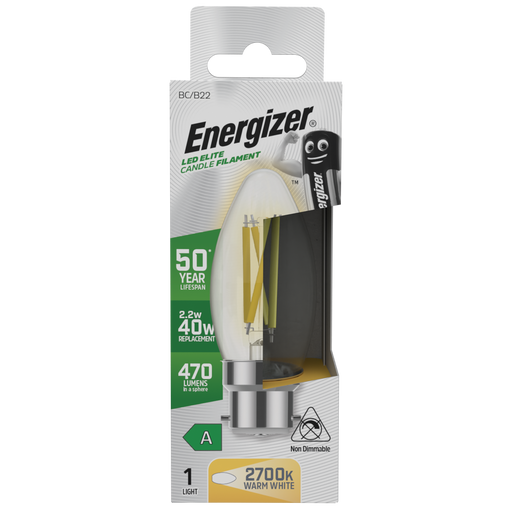
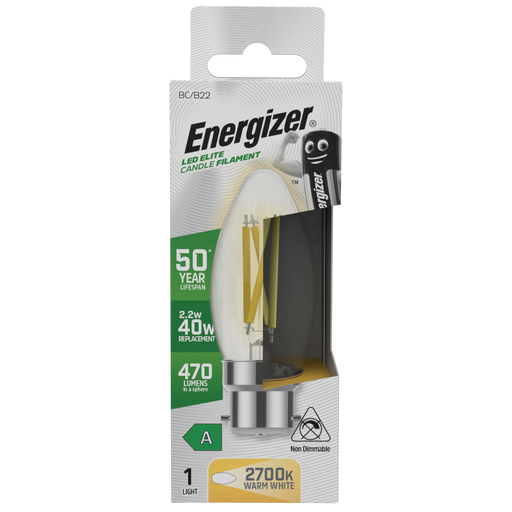
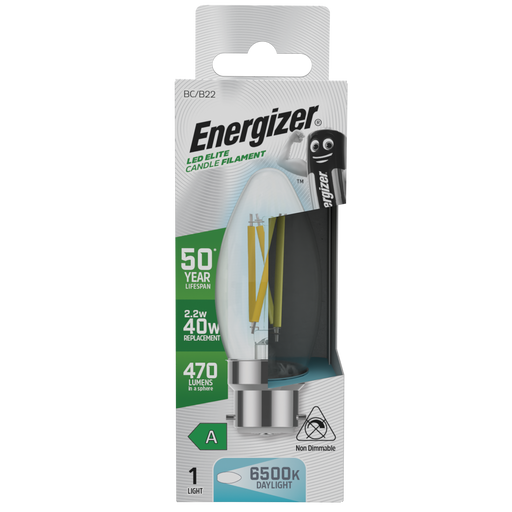
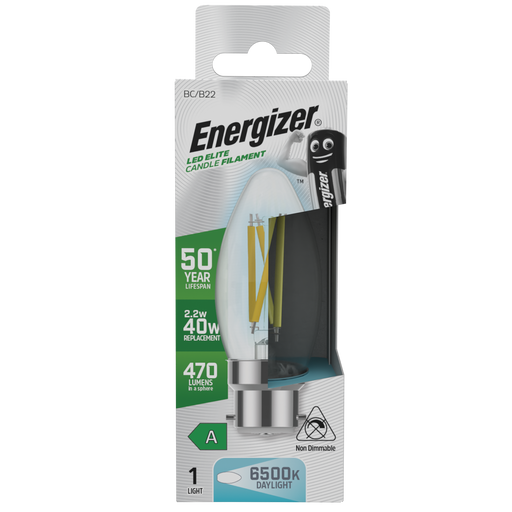
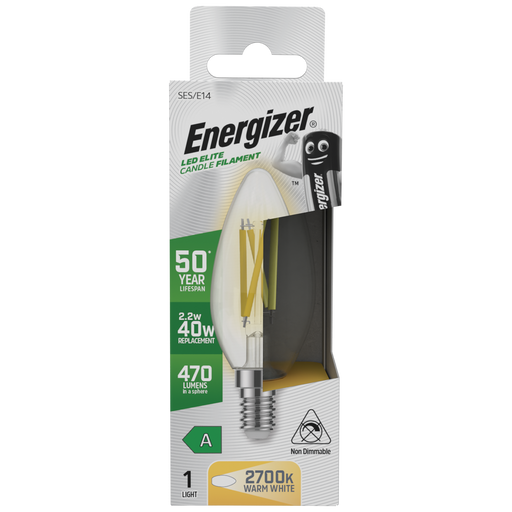
Leave a comment